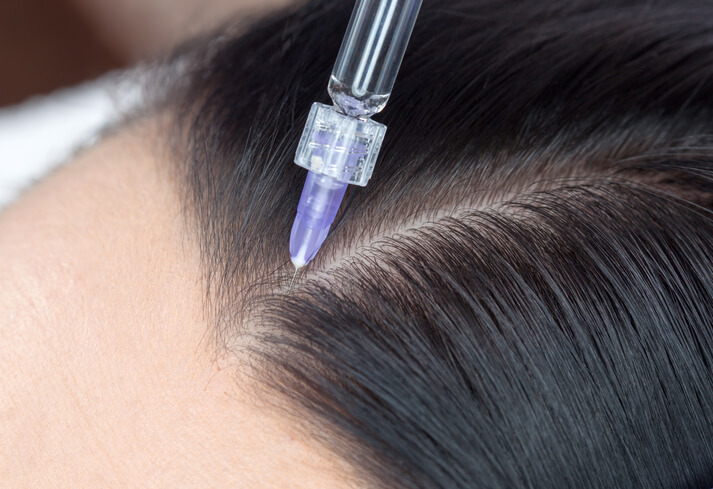Cancer comes with some unpleasant side effects — and chemo hair loss is an obvious one others can see. But recent research explores the idea that a protein shot could actually prevent chemo hair loss. Chemo hair loss is a hot-button issue, since 8% of women consider refusing chemotherapy to avoid it. More breast cancer patients are enjoying disease-free survival, thanks to breakthrough treatments. However, many still struggle with chemo hair loss long after treatment ends. And patients given popular breast cancer drug Taxotere may never see their hair grow completely back. But according to a September 2017 study, one protein shot could potentially change all that.
Researchers Discover Protein Shot Stops Chemo Hair Loss In Mice
A recent New Scientist article summarized data from Sung-Jan Lin’s research conducted at National Taiwan University. Lin and other researchers set out to learn more about how chemotherapy specifically damages hair follicles. And they did it by looking at a protein called p53. Chemo activates this specific protein, which helps suppress tumor growth. But in exchange, it may also suppress hair growth — since those cells, much like cancer cells, rapidly divide.
During their research, Lin and his colleagues found an interesting aspect about protein p53. They found it blocks WNT3a production — a hair-promoting protein. Which posed the following question: If you inject WNT3a into the scalp during chemo treatment, could it prevent hair loss?
To test this theory, Lin and colleagues injected mice with a chemotherapy drug. Immediately afterwards, they injected beads soaked in protein WNT3a just under the surface of the mice’s skin. They found that any areas injected with those beads had a thick coat of fur five days after the mice finished chemo. The areas injected with untreated beads, however, were bald.
What This Study Could Mean for Preventing Chemo Hair Loss In Women
Right now, the best chance humans have to keep all their hair during chemotherapy is a scalp cooling system. And while the results are impressive, cold caps aren’t a perfect solution. It’s considered a success when patients don’t require a wig afterwards — but bald patches are still common.
The Taiwanese team is now attempting to adapt the treatment for effective use on people. Their idea, per the New Scientist article, is to use extra-fine needle for injecting the protein into a patient’s scalp. They’re also hoping to create a cream or gel that works on people.
However, the team faces a few obstacles. Animal studies over the years with good results aren’t using safe, reproducible injection methods that benefit human patients (yet). However, the protein shot does show promise — and hopefully, in time, researchers will get it right for people, too.
What the Protein Shot Could Mean for Breast Cancer Patients
This protein shot could potentially become a hair-saving treatment for breast cancer patients in the future. But Taxotere patients in particular should be wary of treatments claiming to prevent chemo hair loss today. Taxotere studies show about 1 in 12 patients end up with permanent, irreversible hair loss. Survivors given this drug alone or in chemo cocktail treatments may never see hair regrowth.
How Survivors With Lasting Chemo Hair Loss May Qualify for Compensation
If you or someone you love experienced thinning hair or patchy regrowth for six months or longer after finishing chemo, you may qualify for a cash settlement. To check your claim’s eligibility for compensation, complete your free taxotere claim evaluation online today. You’ll answer just three brief questions before seeing your evaluation results online. Seeing if you may qualify takes less than two minutes! Once you’ve submitted your information, an experienced lawyer will call to discuss your case. This phone call is your first step towards getting the justice and compensation you deserve.
Related: New Jersey Taxotere Lawsuits Consolidated for Faster Hearings
